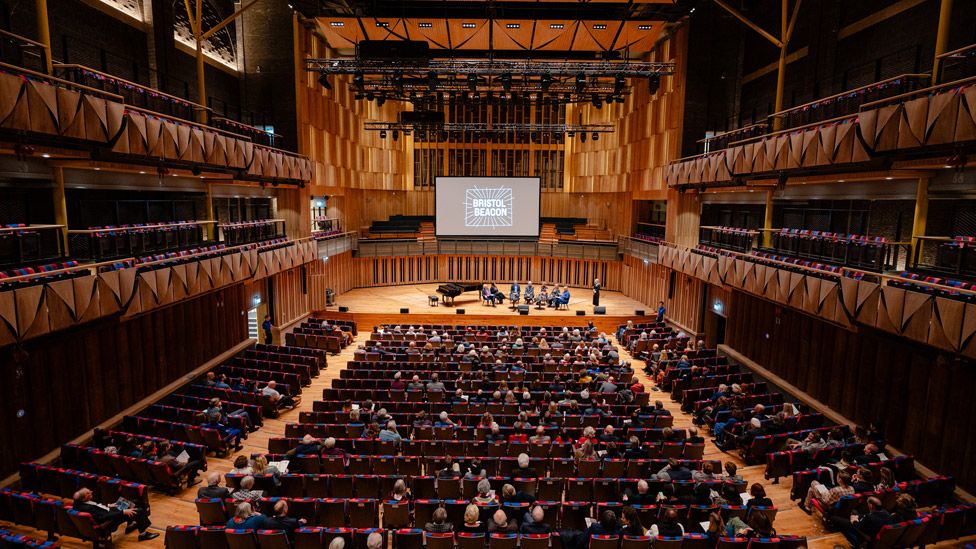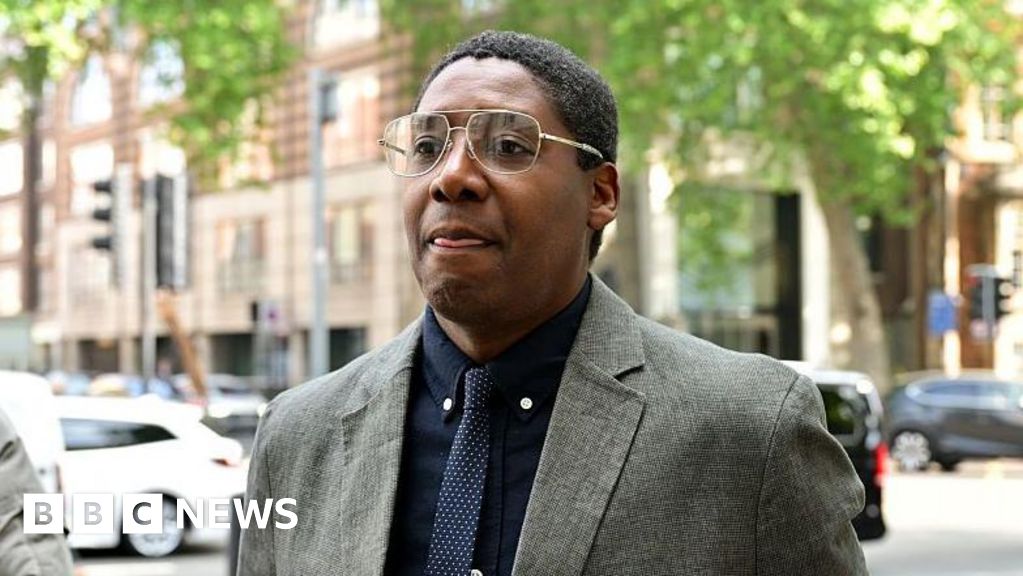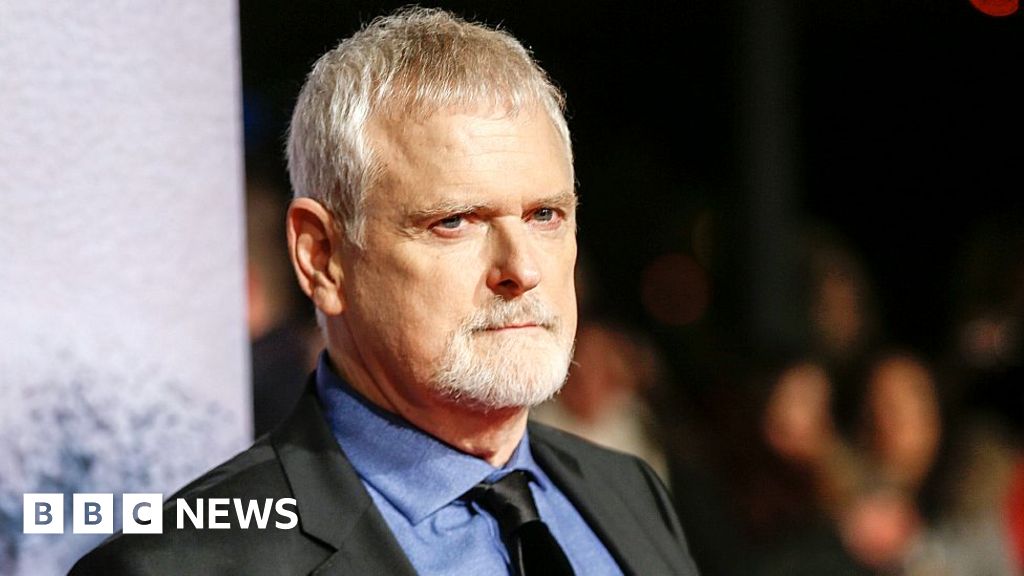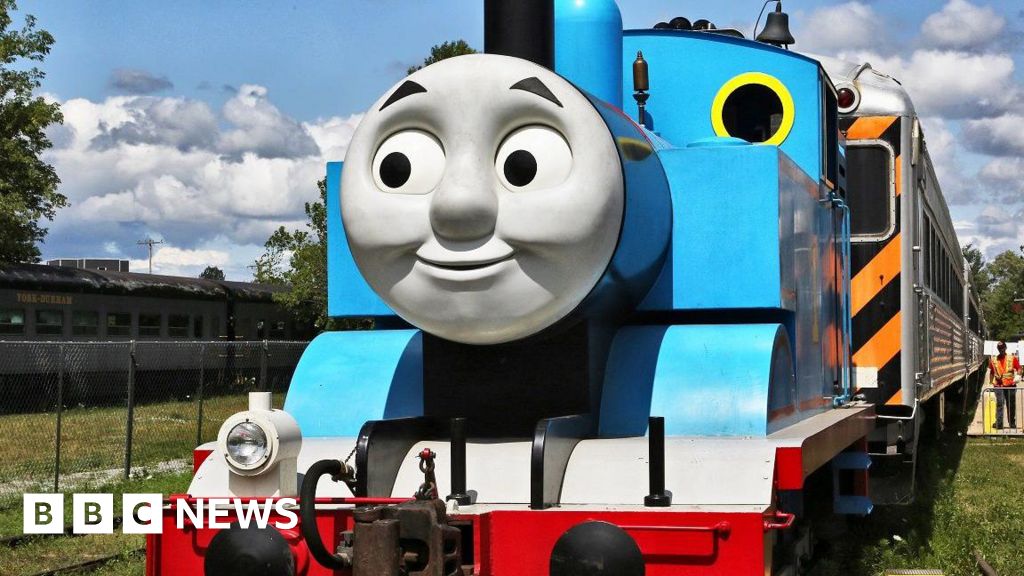ARTICLE AD BOX
 Image source, Chris Cooper
Image source, Chris Cooper
The renovation was supposed to take two years but has ended up taking five
By Ian Youngs
Entertainment & arts reporter
Before it shut for refurbishment five years ago, the historic Bristol music venue formerly known as the Colston Hall was in such a bad state that a single seagull chick could cause serious havoc.
"We did have to shut for three weeks because a baby seagull got into the roof void and dislodged a whole load of asbestos," says Louis Mitchell, chief executive of the Bristol Music Trust, which runs the building.
The pesky gull forced Mercury Rev, Martha Wainwright and the Gurt Lush Choir to find a new venue in 2017. The following year, the venue embarked on a major redevelopment, which has turned out to be costly and controversial.
It was due to reopen in 2020 but will finally welcome back music fans on Thursday, three years late.
The Bristol Beacon is the biggest music venue in south-west England
"I was very grateful that we managed to get to June 2018 without major catastrophe, major building failure," Mitchell says.
"Trust me, it was in a really shaky state, incredibly fragile. That's one of the reasons the project has taken so much longer and the costs have increased in a way that we could not have anticipated five years ago."
The original budget was £48m but has spiralled to £132m, with the city council shouldering most of the increase.
There's also been a debate about the name. The Colston Hall has been rebranded the Bristol Beacon - severing the link with Edward Colston, the slave trader whose nearby statue was chucked into the harbour in 2020.
Image source, PA Media
Image caption,Colston Hall took its name from Edward Colston, whose statue was thrown into Bristol harbour in 2020
Built on the site of Colston's boys' school in 1867, the venue hosted everyone from Rachmaninoff to the Rolling Stones and Robbie Williams in its first 150 years.
When the renovation began, builders found it in an even worse state than they thought. Among a long list of problems, three Elizabethan wells were discovered, including one under the stage; and columns holding up the roof were found to be hollow.
"So we had a building that was about to fall down," Mitchell says. "I think we had the largest concentration of scaffolding in Europe for about two years because we had to basically prop up the outside walls."
Image source, Getty Images
Image caption,The Rolling Stones stopped at Colston Hall during a UK tour in 1971
Now it is an impressive 2,100-capacity hall with improved access, acoustics and comfort. As well as the main auditorium, there are two more performance spaces in a former Victorian recital room and in the cellars where barrels of alcohol from the docks were once stored.
The cellars will be a venue for the Trust's music education work, which also takes place in schools, care homes and hospitals in the city.
Along with staging "many amazing musical performances", the Bristol Beacon will generate £13m a year for the local economy and support 270 jobs, Mitchell says - although it's debatable how much of those can be counted as new benefits or if it's just reinstating things that happened before 2018.
Image source, Lily Holman
Image caption,The Bristol-based Paraorchestra will headline the reopening concert
For Thursday's reopening show, the Bristol-based Paraorchestra, comprising disabled and non-disabled musicians, will perform with local electronic composer and performer Surgeons Girl.
Some of the Paraorchestra's players faced issues even accessing the stage before, but artistic director Charles Hazlewood says it's now a "world class venue".
"I should know, I've been conducting orchestras around the world for well over three decades. This is up there with the very best," he says.
Hazlewood praises those in charge for "sticking to their guns".
Image source, Chris Cooper
Image caption,The main hall can seat 1,800 people, or have 2,100 standing
As costs mounted due to the unexpected complications, inflation and the pandemic, the council considered halting work and mothballing the building. But that would have added tens of millions more to the budget in the long run, according to official estimates.
"At every decision-making point, the financially sensible thing to do was to take the next step," says Labour Mayor Marvin Rees.
Even if he had known the final price tag from the outset, he still would have given the go-ahead, he says.
"If we hadn't taken on this project, we would have a heritage building right in the middle of the city, surrounded by boarding, slowly deteriorating - a negative drag on the city centre economy."
He adds: "When you take that all into account, it's worth the money and it will be a huge boost to Bristol's economy and creative sector."
Image source, Chris Cooper
Image caption,The Beatles, the Berlin Philharmonic Orchestra and David Bowie all played at the old Colston Hall
But the bill is too steep for some. "It's great having a refurbished state-of-the-art concert facility in Bristol, but £132m total is an absolutely extortionate amount of money," says opposition Conservative councillor Jonathan Hucker.
Bristol City Council's contribution has risen from £10m to £84m. It comes at a time when the authority - like many around the country - is facing cuts, while earlier this month a council tower block had to be evacuated after being found to be unsafe.
Having a smart concert venue is "a bit like having a Rolls Royce parked on your driveway when your house is falling down", Hucker says.
The mayor points out that the fund for capital building projects like the Beacon are separate from its housing account and the revenue budget that pays for day-to-day services like social care and education.
However, the council has taken out a 50-year loan to cover the Beacon redevelopment, and the interest will be paid from its revenue budget. The authority estimates this will cost £2.2m a year, but accountants Ernst & Young have warned that interest rates mean it could be "significantly higher".
In an attempt to claw back some of the money, the council has axed its annual subsidy of almost £1m a year to the Bristol Music Trust, which must also repay £8m from its profits - with the threat of being replaced by a commercial operator if it can't.
Image source, Chris Cooper
Image caption,Singer Lady Nade performed at a preview event in the Lantern Hall, the building's second room
The Beacon isn't the only recent major cultural project to see its price spiral.
The cost of the new Aviva Studios in Manchester more than doubled to £242m. Weeks after its official opening, the council leader warned the government she was finding it "increasingly impossible to make ends meet" with the overall city budget.
In Bristol, those in charge hope the Beacon will prove itself to be value for money over time.
"We've got something magnificent here, which I think will be the envy of any modern European city," Mitchell says.
"It brings tangible things but it also brings the intangible joy of music."

 1 year ago
90
1 year ago
90








 English (US) ·
English (US) ·